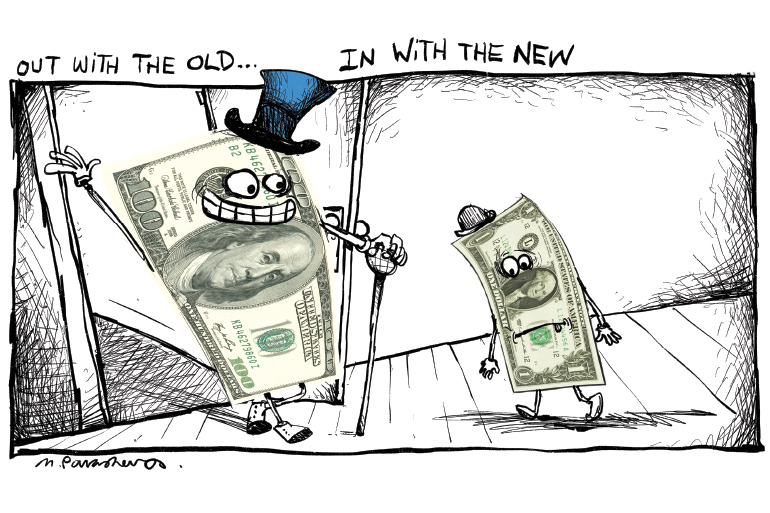Money In & Out: Amounts Are Smaller Coming In and Bigger Going Out

When I first started Dan’s Papers 60 years ago, here is how money was handled.
If you worked for a week ending Friday, on Friday afternoon I wrote you a check for the number of hours you worked times the rate of pay you agreed to for that week. You could go out and cash the check or deposit it in your bank account.
If you cashed it, you could go shopping with the money. A nice feeling. If a blouse had a tag that said it was $20, you gave the merchant $20 and took it home.
A few years went by. There was a change.
I still paid for work done for the week at the end of the week in which it was performed. But if you went shopping for a blouse that had a tag that said it was $20, you gave the merchant $20.80. The merchant would tell you the extra $.80 was for Nelson Rockefeller. He was the governor and he now was charging a sales tax.
A few more years went by and there was another change.
Now when I paid someone at the end of the week for the work that they did—say it was $300 (about $1,900 in today’s money)—I paid them $282.44. The reason was Social Security and other entitlements. Earlier, it had been the responsibility of the worker to pay it at tax time every year, but apparently there were shirkers. So now Dan’s Papers and the other employers made sure it was paid.
At a store buying a $20 blouse, you still paid $20.80, but now, wait a minute, that had changed to $21.10. The tax percentage had gone up.
Then came still more changes.
If you finished work on Friday and held your hand out asking for your check, you got told, in some places, that you would now be paid on Monday, because the company needed a few days to figure out how much less than the original amount was owed to you.
Another change.
Credit cards were invented. This was a great convenience, because you didn’t have to pay the $21.20 (it was still creeping up) right away for the blouse. You could go home with it without actually giving them any money at all. They’d just swipe your card. And the card company would make the payment later on and you paid the credit card company when they sent you a bill. The trade-off was that if you didn’t pay the credit card company’s bill on time, they’d add onto it a staggering penalty, often as much as 22% a month, until you did. The $20 blouse could end up costing you $120.
Time went by.
Now most companies wouldn’t be paying you for the hours you worked until a further week went by. Doing the deductions seemed to have become more complicated than they thought. So you’d no longer be getting paid on Friday for the work you did that week, but for the work you did the week before. In essence, you were lending the company you worked for a week’s pay.
A few years later, companies decided if one week was good, then two weeks was better. The new rule put into effect was now finish your week’s work and you got paid 14 days later—less the deductions, of course.
Next came pay in advance. It started in stores as layaway. Give them bits of money at a time, and when, at a later date, it gets to what the cost is, they give it to you.
Soon they began doing it with food, especially fast food. Go into the drive-up at a McDonald’s and order a Big Mac with fries and a chocolate shake and proceed to the first window. There you pay. Then you’re off to the second window and they give you the food.
I thought about this when I first did it. And I figured it out. If you got the food at the first window, you might just drive off without paying. Hey!
And now it’s spreading. Lots of companies require you pay ahead. Notice your phone bill? It’s for the upcoming month. Your cable bill? Same thing. Pay now, get the service later.
And here comes direct deposit. You don’t get paid at all. Instead, the company you work for sends your pay electronically to your bank. And they do it twice a month, rather than every two weeks, a little creep to 15 days from 14. Is it available the day it hits your bank account? Or do you have to wait five days? Not sure.
Things used to be what they seemed. No more.



